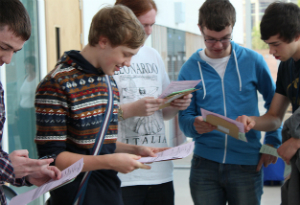A-level results day 2016: Record number of university places awarded
- Emma Finamore
- 18 Aug 2016
But changes to the curriculum and exams mean many students don’t get the grades they expected, says teachers' union.

A record number of A-level students have achieved a university place this year, but the UK’s largest teacher’s union has warned many will be disappointed due to recent changes to the curriculum and exams.
The number of university places awarded is up 3% on last year, according to UCAS. Mary Curnock Cook, UCAS head, said 424,000 students will be offered their first or second choice of degree course.
However Chris Keates, general secretary of NASUWT (The National Association of Schoolmasters Union of Women Teachers), said teachers and students had struggled with new syllabuses that were introduced this year and could impact results.
Keates said the changes would particularly affect those receiving AS-level results - the first group to go through the new curriculum, and that teachers and students did not have enough time to adapt to the changes.
“Students and their teachers are bracing themselves for greater volatility in this year’s results, particularly at AS level with the first students sitting exams under a new curriculum this year," said Keates.
“Students and teachers have had a very short timescale to get to grips with the new syllabuses, particularly at a time when they have been trying to prepare for the introduction of revised A level courses from next month.
“Teachers, as usual, have worked hard to ensure that standards have been maintained despite this upheaval and the cuts to budgets in the post-16 sector, which have had a significant impact on the staffing levels and resources available in schools and colleges.
“Young people have continued to excel despite these challenges which have been compounded for many by the Government’s removal of financial support for the most disadvantaged students and its cuts to the system of independent careers advice and guidance.
“Tomorrow offers an opportunity to celebrate the talent of our young people, but should also provide pause for thought about the increasing barriers that students and schools are facing to achieve this success.”
Students and teachers have had a very short timescale to get to grips with the new syllabuses, particularly at a time when they have been trying to prepare for the introduction of revised A level courses from next month.
“Students and teachers have had a very short timescale to get to grips with the new syllabuses, particularly at a time when they have been trying to prepare for the introduction of revised A level courses from next month.
“Teachers, as usual, have worked hard to ensure that standards have been maintained despite this upheaval and the cuts to budgets in the post-16 sector, which have had a significant impact on the staffing levels and resources available in schools and colleges.
“Young people have continued to excel despite these challenges which have been compounded for many by the Government’s removal of financial support for the most disadvantaged students and its cuts to the system of independent careers advice and guidance.
“Tomorrow offers an opportunity to celebrate the talent of our young people, but should also provide pause for thought about the increasing barriers that students and schools are facing to achieve this success.”
News
- What are school leavers’ most popular careers by gender?
- Parents are adding to students’ exam results stress
- A-level results 2015: clearing offers on Facebook, Twitter & Skype
- Jaguar Land Rover is voted the UK's best employer
- Find your path
- A-level results 2015: more women than men entering university
- SATs week: 45% of school children scared they’ll be “embarrassed” by their results
- 70% of young Brits have a ‘side hustle’
- Civil Service Apprenticeship Positions Set to Double for 2015
- London is the best city in the world for students